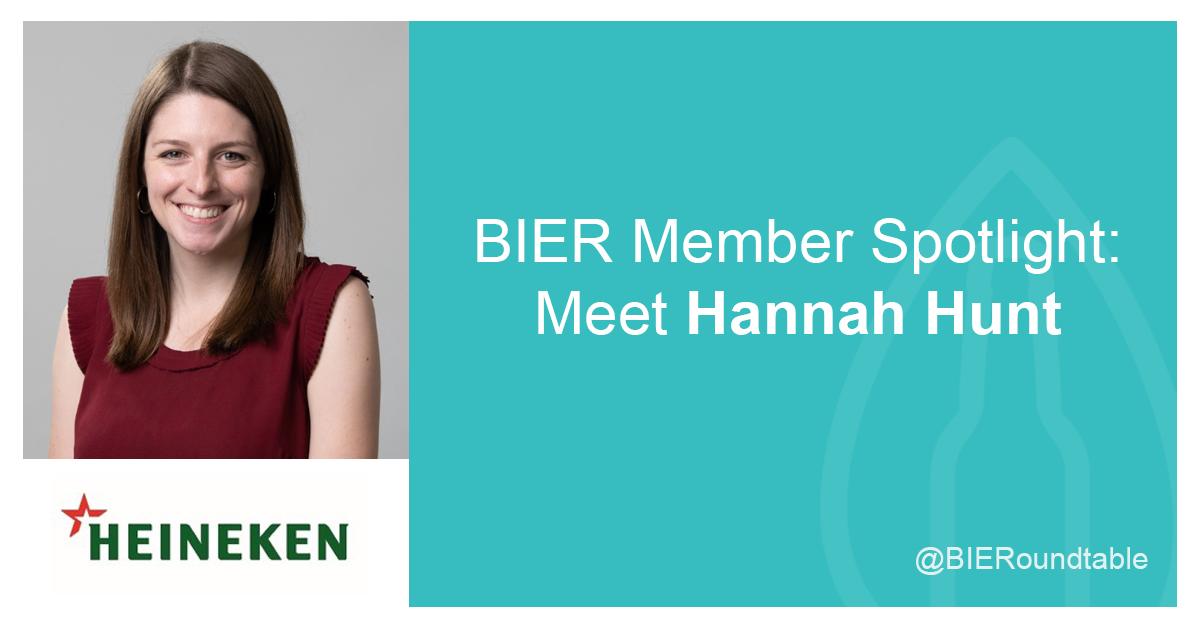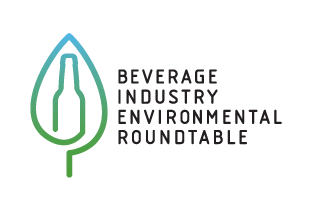BIER Member Spotlight: Hannah Hunt
Meet Hannah Hunt

Name: Hannah Hunt | Carbon Policy Lead
Company: HEINEKEN
Connect with Hannah on LinkedIn
Welcome to our series aimed at spotlighting the individual leaders within BIER member companies and stakeholder organizations. Learn how these practitioners and their companies are addressing pressing challenges around water, energy, agriculture, climate change, and what inspires each of them to advance environmental sustainability in the beverage sector and collectively, overall.
Briefly describe your role and responsibilities and how long you have worked with your company.
I’ve been with HEINEKEN for almost three years, working as part of the Global Corporate Affairs Sustainability team. My role involves both internal policy development and external advocacy, primarily focused on our carbon agenda. However, my work also extends into broader aspects of our climate and nature strategy under HEINEKEN’s 'Brew a Better World' initiative.
How has the company's sustainability program evolved over the years, and what are your specific priorities for 2025?
HEINEKEN’s sustainability agenda has been evolving for over a decade, long before I joined. In 2021, we launched the latest iteration of our strategy, Brew a Better World. This is when we first announced our ambition to reach net zero carbon across our value chain (Scope 1, 2 and 3) by 2040. Since then, I’ve seen real progress in both the sophistication of our approach and the scale of our efforts.
One of the biggest shifts has been the expansion of internal expertise. We've significantly increased the number of people dedicated to sustainability—now more than 50 at our head office alone—while also upskilling teams across functions like legal, supply chain, procurement, and finance. This integration has been critical in embedding Brew a Better World into daily business operations.
Our roadmap focuses on emissions reductions, systematically reducing emissions across our sites while strengthening our reporting and disclosures. It often feels like we’re building the machine as we operate it, but seeing our progress in the first half of this decade has been rewarding. With our goal to reach net zero in Scope 1 and 2 by 2030, scaling these efforts is more important than ever.
Looking ahead to 2025, it’s about sharpening our focus. Environmental sustainability today requires a more holistic approach, addressing not just carbon but also water, biodiversity, land management, and circularity. For example, we recently set circularity targets to increase the reusability and recycled content of our packaging, directly linking back to emissions reductions. Water is another major focus, given its central role in making beer.
On a personal level, 2025 is an exciting year for my work. While our primary focus remains emissions reductions, we’re also laying the groundwork for high-quality carbon removals. Following Science-Based Targets initiative (SBTi) guidelines, once we reach a 90% reduction in emissions, we’ll address the remaining 10% through removals. We’re being deliberate in our approach; we want to ensure the credibility of projects by aligning with improved industry standards like the Integrity Council for the Voluntary Carbon Market (ICVCM) and the incoming EU Carbon Removal Certification Framework.
Our first steps are exploring nature-based solutions for carbon removals on our own lands and through our long-standing water balancing projects, which could provide further opportunities for reforestation and afforestation.
Ultimately, 2025 is about scaling what works, ensuring integrity in our ambitions, and continuing to embed Brew a Better World into how HEINEKEN operates.
How do you feel being a BIER member will help you successfully address the key areas you are addressing in 2025?
I’m really looking forward to deepening my engagement with BIER this year. While HEINEKEN has been involved for some time, I personally plan to step in more actively in 2025, and I see real value in the collaboration it fosters.
One key example is our collective work on land management and zero deforestation policies. Many BIER member companies are navigating similar challenges, particularly around the interpretation and implementation of the EU Deforestation Regulation (EUDR). Having a dedicated workstream within BIER allows us to align on a shared understanding of the regulation, helping us approach it consistently across the industry. It also provides a unified platform to seek clarity where needed.
It’s one of the things I appreciate most about BIER – the knowledge-sharing that happens when we come together. There’s something incredibly practical about being able to bring a common issue to the table, in a formal and transparent way. One company may be able to say, “We actually just mapped that out – we can share what we learned with the group.” Those real-world insights, from people facing the same operational challenges, are hugely beneficial.
Ultimately, being part of BIER helps accelerate solutions by leveraging collective expertise, creating opportunities for direct, practical knowledge exchange.
Name one of the practical solutions or best practices you learned in working with BIER and its members and why it was important to you and/ or your company.
Up until recently, my involvement with BIER had been more of a light touch, but over the past six months, I’ve had the chance to observe and learn from the collaboration happening within the group—particularly in the water workstreams. For example, it’s been fascinating to see BIER members come together to address shared challenges in overlapping watersheds.
BIER is designed for knowledge-sharing and tackling technical topics, but what stands out to me is seeing that collaboration translates into real, on-the-ground impact. When multiple companies operating in the same watershed work collectively, it goes beyond just exchanging best practices—it drives meaningful action.
This kind of localized approach is very much part of HEINEKEN’s identity. For example, any carbon removals investments we make in the future must have a clear connection to our local communities. Compared to other industries I’ve worked with, I’ve noticed that this isn’t just a HEINEKEN principle, but something deeply embedded across many BIER members as well. There’s a shared understanding that sustainability efforts should be rooted in the communities where we operate, which makes the collaboration within BIER even more valuable.
Share a recent accomplishment of your company’s sustainability initiatives/achievements you are most proud of and why.
While I’m proud of all our 2024 annual results, one initiative from the past year that stands out to me is the launch of REfresh Alliance. This was a major cross-company, cross-industry idea—HEINEKEN, along with Coca-Cola and Diageo, came together as founding members to create a platform aiming to help our common suppliers transition to renewable electricity.
What makes the REfresh Alliance unique is that it will go beyond just education. Many of us have made strong progress in sourcing renewable electricity within our own operations, but we recognized that our suppliers—many of those in shared markets—needed additional support. REfresh provides not only education on renewable electricity but also hands-on guidance in navigating the complexities of contract negotiations and commercial agreements. That extra step is a real value-add and a key differentiator.
Because of its commercial nature, REfresh sits outside of BIER, but BIER has still played an invaluable role in helping us recruit additional members. What started with three founding companies has now grown to nine participants across the beer, soft drinks, water, and spirits industries.
It is a huge team effort—our procurement team played the central role, my focus was on setting the governance and framework to ensure smooth and legally compliant collaboration. Now that REfresh has launched and recruitment has been successful, the real work begins: execution. I’m excited to see the impact it can have as we move forward.
If you had one superpower that could be used to radically accelerate and scale sustainable best practices, which one would it be, and how would you use it?
If I could have one superpower to accelerate and scale sustainable best practices, it would be the ability to instantly speak and understand any language—both literally and figuratively.
So much of the work we do in sustainability isn’t just about technical solutions; it’s about bridging communication gaps. Many challenges arise not because of disagreement but because of differences in background, perspective, or language. Whether it’s aligning with teams across regions, ensuring supply chain partners fully understand our requirements, or translating environmental sustainability goals into something meaningful for sales teams, so much time is spent just trying to get on the same page.
This superpower wouldn’t just mean speaking every spoken language—it would also mean fluently adapting my communication to any audience, whether it’s a procurement expert, a supply chain manager, or a finance team. Being able to instantly frame sustainability in a way that resonates with whoever I’m talking to, and for them to do the same, would be a game changer. Sustainability at its core is about storytelling and finding common ground. If we could eliminate those friction points, remove cultural or technical misunderstandings, and create instant clarity, we could move so much faster toward our goals.
And beyond just me having this ability, imagine if everyone working on sustainability could do the same. That would truly accelerate progress in a way no policy or technology alone ever could.

